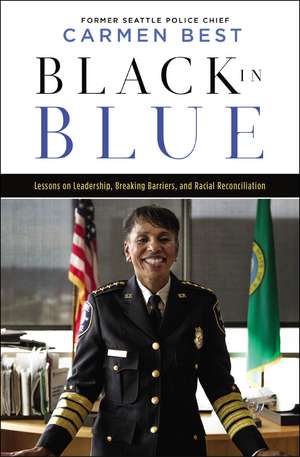Black in Blue: Lessons on Leadership, Breaking Barriers, and Racial Reconciliation
Autor Carmen Besten Limba Engleză Paperback – 5 sep 2022
Chief Carmen Best has spent the last 28 years as a member of a big-city police force, an institution where minorities and women have historically found it especially difficult to succeed. She defied the odds and became the first Black woman to lead the Seattle Police Department.
During her tenure, she was successful in bringing significantly more diversity to the force. However, when the city council cut her budget amid months of protests against police violence, she had no choice but to step aside. Without the city’s support, she felt she wouldn’t be able to continue changing the status quo of the police force from within.
Throughout her career, Chief Best has learned lessons that those coming up behind her can benefit from. In this book, she will use her story to share those urgent lessons. Readers will read about:
- How Chief Best grew up to believe in the change she set out to create.
- Her early days in the police force, including lessons from the academy and her time on patrol.
- How she progressed in her career within a primarily white law enforcement culture and the events that led to her becoming Chief.
- How she built her team and overcame the politics involved in her high-level position until the call for defunding came.
| Toate formatele și edițiile | Preț | Express |
|---|---|---|
| Paperback (1) | 109.37 lei 22-36 zile | |
| HarperCollins Leadership – 5 sep 2022 | 109.37 lei 22-36 zile | |
| Hardback (1) | 149.04 lei 22-36 zile | |
| HarperCollins Leadership – 25 oct 2021 | 149.04 lei 22-36 zile |
Preț: 109.37 lei
Nou
20.93€ • 21.91$ • 17.42£
Carte disponibilă
Livrare economică 10-24 martie
Specificații
ISBN-10: 1400238420
Pagini: 240
Dimensiuni: 139 x 216 x 16 mm
Greutate: 0.18 kg
Editura: HarperCollins Leadership
Colecția HarperCollins Leadership
Locul publicării:Nashville, United States
Descriere
Chief Carmen Best has spent the last 28 years as a member of a big-city police force, an institution where minorities and women have historically found it especially difficult to succeed. She defied the odds and became the first Black woman to lead the Seattle Police Department.
During her tenure, she was successful in bringing significantly more diversity to the force. However, when the city council cut her budget amid months of protests against police violence, she had no choice but to step aside. Without the city’s support, she felt she wouldn’t be able to continue changing the status quo of the police force from within.
Throughout her career, Chief Best has learned lessons that those coming up behind her can benefit from. In this book, she will use her story to share those urgent lessons. Readers will read about:
- How Chief Best grew up to believe in the change she set out to create.
- Her early days in the police force, including lessons from the academy and her time on patrol.
- How she progressed in her career within a primarily white law enforcement culture and the events that led to her becoming Chief.
- How she built her team and overcame the politics involved in her high-level position until the call for defunding came.
Notă biografică
Police Chief Carmen Best was the first Black woman to lead Seattle's police force until she announced her resignation in August 2020 following budget cuts.
Chief Best was hired by the Seattle Police Department in 1992 and, prior to being appointed chief, had held the ranks of officer, sergeant, lieutenant, captain, and deputy chief. Chief Best took over as interim chief of police on January 1, 2018, replacing Kathleen O'Toole, and was later appointed permanent chief by Seattle Mayor Jenny Durkan, effective from August 13, 2018.
She became the first Black woman to serve as Seattle's chief of police. On August 10, 2020, after the Seattle City Council voted to downsize the department by about 100 officers, she resigned, stating that she could not in good conscience shrink and thereby reduce diversity in the department which she had just grown by 110 officers in 2019 (with 40% of those new hires being persons of color). Under police union rules, the last hired would be the first to be laid off, disproportionately affecting officers of color.
